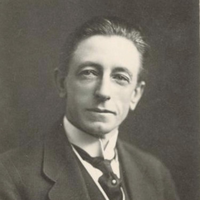A Ballad of Freedom
Now Mr. Jeremiah Bane
He owned a warehouse in The Lane,
An edifice of goodly size,
Where, with keen private enterprise,
He sold imported napery
And drapery - and drapery.
His singlets and his socks were sent
Out over half the continent;
In clothing for the nursery
And mercery - and mercery
He plied a most extensive trade,
And quite enormous prodfits made,
And barracked, with much fervency,
For foreign-trade - described as ‘Free.’
He said,
Indeed,
It was
His creed.
The trade described as Free.
And this good man was known to fame
For charity; indeed, his name
Shone often in the daily press.
When needy folk were in distress
He aided - (with publicity)
Mendicity - mendicity.
And though much cash he thuswise spared
There still were people who declared
His act of private charity
A rarity - a rarity.
Donations, duly advertised,
From business point of view, he prized;
But 'good by stealth’ he ne’er could see
Was any use to such as he.
But still,
The press,
With much
Success,
Declared his hand was free.
Now Mr. Bane’s employees were
Wont to address the boss as ‘Sir,’
To show him most intense respect;
And there were few who would neglect
To couple with civility
Humility - humility.
They dressed in cheap but pretty clothes,
And ev’ry man turned up his nose
And scorned familiarity
Or parity - or parity
With ill-dressed toilers who ‘combined.’
They thought proceedings of that kind
Were of a very 'low’ degree,
For they were ‘cultured,’ don’t you see.
’Tis true
Their pay
Was mean,
But they
Felt proud to be so free.
Though they were vilely underpaid
They were too proud - or else afraid
To advertise the fact abroad
Or see to get a Wages Board.
Besides their meek servility,
Gentility - gentility
Forbade so rash an act; but still
One man there was - (his name was Bill)
Who vowed their fool propensity
Was density - was density
An unenlightened state of mind,
A lack of wit that made them blind.
‘You’re but a lot of worms,' said he.
‘If you were men you’d clearly see
Until
You band
And make
A stand
You never can be free.’
And ev’ry day this person, Bill,
Conversed with them of unions till
They owned his arguments were true,
And one by one waxed eager to
Embrace an opportunity
For unity - for unity.
They talked about a Wages Board
Which, formerly, they had abhorred,
And girded at their slavery
With bravery - with bravery.
Each man began to feel 'The Firm’
No longer owned it for its worm;
Their independence they could see
Achieved by simple unity;
Forgot
Their clothes
And mixed
With those
Who battle to be free.
When Mr. Bane one morning heard
About his thing he cried, 'Absurd!
They’ll never get my clerks to horde
With those who seek the Wages Board,
And lose respectability!
Futility! - Futility!
My clerks are gentlemen who’d scorn
To mingle with the lowly born.
Such bosh I’ve never heard!' said he.
‘Absurd!’ said he - ‘Absurd!’ said he.
‘As for their pay, they’re quite content
They’ve never asked an extra cent!
And in
The morn
They’ll mark
Their scorn,
And show you they are free.’
And on the morrow Mr. Bane
Called them together to 'explain’:
‘I have a small petition here
But first, I wish to make it clear,’
Said he, with simple gravity
And suavity - and suavity,
‘That no man here is asked to sign.’
(His voice was gentle and benign)
'I trust to your humanity
And sanity - and sanity
To guide you; but I feel quite sure
That Wages Boards you can’t endure.
I leave it all to you,' said he.
‘It makes no difference to me.
My views
Are known,
But still,
I’ve shown
Your choice in this is free.’
The staff it looked at Mr. Bane,
And in his eye it read, quite plain,
‘Neath that expression so benign,
The fate of him who did not sign
A vision of futurity
Obscurity - obscurity
A dearth of work - in short, the sack.
They knew that he who answered back
Would earn, by his temerity,
Severity - severity.
So one and all, with shaky pen,
Signed this refusal to be men....
But surely, as you must agree,
Their choice was free as it could be,
They said
The Board
They all
Abhorred,
Preferring to be free.
Still Mr. Bane grows fat and sleek,
And still, at thirty bob a week,
His clerks slave on from morn till night,
No hope of better things in sight.
But Bane, with much benignity
And dignity - and dignity,
When talk of Wages Board is heard,
Declares the notion is absurd:
’My clerks with prompt celerity
And verity - and verity
Refused the thing with one accord.
The clerks themselves don’t want the Board!
It is preposterous,' says he,
‘To force it on who don’t agree
And still
His men
With brain
And pen
To fatten him are free.

